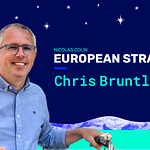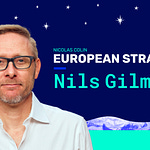The Agenda 👇
Mariana Mazzucato on how to create value post-COVID-19
We need to turn gig work into good work
Tony Hsieh’s legacy in Las Vegas
Why is Brexit happening, exactly?
A prelude to “11 Notes on Silver Lake”
Next week: The Family’s Go-To-Market workshop
More insights for entrepreneurs from The Family
The latest Building Bridges podcast is out, featuring one of the world’s most in-demand economists: UCL professor and founder of the Institute for Innovation and Public Purpose, Mariana Mazzucato. My wife Laetitia spoke with her about her previous books on the relationship between entrepreneurship and the state and how we assign value to things, as well as the ways in which the world can build back better in the wake of the COVID-19 pandemic.
You can listen to their discussion using the player above, or by following this link: Rethinking the State 🎧
📳 No, Gig Workers Are Not Your Servants
For years, there has been an argument floating around that tries to shame users of the gig economy into not participating in it. But it’s a flawed argument that is actually quite destructive, as it presupposes that it’s impossible to turn gig economy jobs into good work via an upgraded social contract. As I’ve been arguing for years, including in my book Hedge, this simply isn’t true—and the history of factory jobs proves it.
The fact is that the gig economy provides vital services to many middle-class households, acting as a powerful mechanism in the fight against what Elizabeth Warren calls the “two-income trap”. And it’s also true that the resistance of such service jobs—in restaurants, ride hailing, human services, and many more—to Taylorism meant that they have long remained poor quality, and it’s no surprise that workers accustomed to the steady jobs in factories are reluctant (at best) to shift into those sectors.
But once again, the answer isn’t in shaming those who are using products that provide better, much-needed personal services. The answer is in upgrading our social contract and taking advantage of the entrepreneurial opportunities afforded by today’s increasingly powerful technologies. In doing so, a productivity surplus can be generated, one that matches (or exceeds!) the surplus generated by Taylorism during the 20th century.
👉 I went further in No, Gig Workers Are Not Your Servants.
😔 Tony Hsieh’s Other Legacy
Over the past week, the tech world has been mourning the passing of Tony Hsieh. As CEO of Zappos, Tony was one of the few that really redefined what e-commerce could be, to the point where the undisputed king of that arena, Amazon’s Jeff Bezos, bought Zappos back in 2009 and left Hsieh in charge, apparently expressing a desire to learn from how he achieved his radically customer-focused growth.
There was another project that Tony devoted himself to that greatly interested me a while back, when Alice, Oussama and I were thinking about what it takes to develop a tech ecosystem in a given location: the Las Vegas Downtown Project. His goal was to revive an area that had been largely abandoned as Las Vegas developed along the Strip, relocating Zappos headquarters there and pushing to build a community that embraced not just like-minded tech people but also local stakeholders.
It’s not an easy task, as many cities around the globe can attest. Sure, the Las Vegas project is largely seen as a success. But there were certain factors linked to how life in the US is organized that could have made it easier to pull off there than in a European city such as London or Paris.
👉 Read more about a man who left a mark on virtually everyone he met in Tony Hsieh’s Other Legacy.
🇬🇧 First Manufacturing, Then Financial Services, Then Brexit, Then What?
It’s hard to believe given what the world has gone through over the past four years, but Brexit was voted through prior to Donald Trump winning his term in the White House. Today, Trump is on his way out (slowly but surely 😉), but Brexit is still up in the air, with negotiations dragging on and the prospect of no-deal looming large.
And really, perhaps that shouldn’t come as a surprise. If we look at Britain’s history, it’s clear that Brexit came along as a new solution to a recurring problem: How can the UK continue to find the productivity gains that have made it prosper over the past centuries? That savior role was played by manufacturing during the Industrial Revolution, an empire of trade during the 19th century, and financial services at the dawn of the 20th century.
Unfortunately for the UK, times have drastically changed. The world is pulling back from globalization; over-reliance on financial services has widened an inequality gap that in turn has created many very angry voters; and the EU seems entirely disinclined to leave its banking apparatus in a country that has made clear its desire to go its own way.
👉 I looked at why Brexit appears so clearly anachronistic today in First Manufacturing, Then Financial Services, Then Brexit, Then What?
💼 On Jerry Neumann’s Productive Uncertainty (Round 2)
Silver Lake has been on my radar for some time, and I’ve decided to use its example as I push forward with my “11 Notes” series. That’s just one more effect that reading Jerry Neumann’s “Productive uncertainty” essay had on me: his thesis, together with some of Bill Janeway’s thinking, can serve as a productive framework for understanding Silver Lake and today’s private equity environment.
At its heart, the uncertainty that drives the bets made in venture capital is generally anathema to private equity investors, who see their job as properly assessing risk, with uncertainty being a direct contributor to losing money. In this context, how can private equity participate in the portion of the economy where most profits are currently being made, i.e. the tech sector?
Well, Silver Lake is making moves to deepen its exposure to the sector. And my suspicion is that there’s something important here for European startups. There could be a way to mitigate uncertainty due to the more fragmented markets that they’re aiming at, while also opening up new funding possibilities beyond traditional venture capital.
👉 I keep “working in public” on this topic in On Jerry Neumann’s Productive Uncertainty (Round 2).
Sounds interesting? Subscribe to European Straits and let me know what you think!
🏝 Next Wednesday will bring the latest in my firm The Family’s online workshops, this time focusing on Go-To-Market. The Entrepreneurial Age is bringing forward lots of tools to help make entrepreneurship easier, but one simple fact always remains: you have to find, nurture, and grow your customer base. No matter how good your product is, that’s a challenge.
This is a 2-hour workshop featuring my fellow directors Oussama, Balthazar and Mathias discussing errors to avoid, B2B and B2C strategies for bringing your product to people and more, including networking time with your fellow participants. Tickets are free, sign up here.
📖 And as you’ll have likely noticed over the past few weeks, my fellow The Family directors and I are sharing startup lessons as we move towards the end of the year and the beginning of our newest batch of startups in January. Over the past week we’ve covered:
A critical social topic for founders: Diversity is not an option.
Understanding one big distinction in a common piece of startup advice: Blindness is bliss, ignorance a curse.
Thinking long-term when it comes to fundraising: In fundraising, trust comes before FOMO.
Why entrepreneurs shouldn’t be worried about competition: Competition doesn't kill startups.
From Industrial Policy: China Gets It, We Don't (October 2020):
China is doing everything right [when it comes to industrial policy]: they have the drive from both a government focused on building and very large downstream tech companies that are racing ahead of the technological frontier. They also have the means to invest in basic research and the Communist Party providing a capacity to coordinate the efforts between the private and public sectors and ensure that the direction is clear for everyone (and that it serves China’s strategic interests relative to the rest of the world).
All recent editions:
On Jerry Neumann’s Productive Uncertainty (Round 2)—for subscribers only.
First Manufacturing, Then Financial Services, Then Brexit, Then What?—for subscribers only.
Tony Hsieh’s Other Legacy—for subscribers only.
No, Gig Workers Are Not Your Servants—for subscribers only.
What to Make of Low Interest Rates—for subscribers only.
Remote Work. Stories. Opportunities in Asia. Productive Uncertainty. Low Interest Rates.—for everyone.
On Jerry Neumann’s “Productive Uncertainty” (Round 1)—for subscribers only.
Another Round on Expanding in Asia—for subscribers only.
European Tech’s Forgotten Stories—for subscribers only.
Around the World w/ Bruno Maçães. America's Strength. SaaS. The New Wise Men. Democratizing Upside.—for everyone.
European Straits is a 5-email-a-week product, and all essays are subscriber-only (with rare exceptions). Join us!
From Munich, Germany 🇩🇪
Nicolas




















Reinventing the State w/ Mariana Mazzucato. The gig economy. Brexit. Silver Lake. Tony Hsieh and Las Vegas.